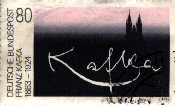 |
 |
|||



Eduard Goldstücker
Eduard Goldstücker, writer, diplomat and scholar, born May 30 1913; died October 23 2000
Literary scholar and prominent figure in the Prague spring of 1968
by Ruth Tosek and Marian Sling
Professor Eduard Goldstücker, who has died aged 87, was one of the last surviving protagonists of the Prague spring of 1968. During that time he was the chairman of the Czech Writers' Union and deputy vice-chancellor of the faculty of philosophy at Charles University.
Goldstücker had many close friends and colleagues in Britain. The turbulent events in his homeland caused him twice to seek refuge in Britain: firstly in 1939 as a young Jewish communist, fleeing the Nazi occupation, and secondly after the Soviet-led invasion of 1968. In Britain he was professor of comparative literature at Sussex University.
Goldstücker was born in a small town in Slovakia, studied in Prague and later, during his first exile in Britain, at Oxford. He joined the Czechoslovak Communist party in the 1930s, at the time of the rise to power of fascism in Germany, and was then most active in anti- fascist organisations.
In Britain, on completing his studies, he joined the Czechoslovak government in exile. Towards the end of the war he was appointed to the Czechoslovak diplomatic service, where he spent time in Paris and London. He subsequently became the first Czechoslovak ambassador to Israel at the beginning of the 1950s.
The Stalinist regime had been established in Czechoslovakia in 1948 and by the early 1950s purges were in full progress. Goldstücker was recalled from Israel and arrested. He was one of those involved in the show trials. Having spent the war years in the west and being of Jewish origin, he was a natural target.
The prosecutor demanded that he be given the death sentence, which was later commuted to life imprisonment. Goldstücker spent his years in jail under the most inhuman conditions in the Czechoslovak uranium mines - without any protection against radiation.
During the political thaw following Stalin's death in 1953, Goldstücker was released and began teaching German studies at Charles University. He was particularly known for his work on Franz Kafka and Prague's German-speaking writers. In 1967 he organised a conference on Kafka, an event well remembered because the regime had always suppressed Kafka's works, labelling them "hostile to socialism". Goldstücker was particularly interested in Kafka and was one of the most erudite scholars of his work. He had a wide know-ledge of German literature and could recite entire passages from the works of the likes of Heine and Goethe.
As chairman of the Czech Writers' Union, and as a member of the Czech parliament, he played a leading role in the movement to reform the repressive regime and restore freedom of speech - the 1968 Prague spring. He was working for the restoration of the ideals of socialism that had brought him into the left-wing movement and to which he remained faithful.
The Soviet-led invasion in August 1968 was a terrible shock and he was forced to emigrate. Accompanied by his wife Marta he returned to Britain and the Sussex University professorship. He also lectured at various western European literary institutions - his memoirs, written during this period, have so far been published only in German.
Immediately after the collapse of communism in Czechoslovakia, Eduard and Marta returned to their native country, where their two daughters, Anna and Helena, and their families lived. He was anxious to offer his knowledge to a country being reborn. But the new establishment was not interested in taking advantage of his experience and erudition. As a "68er" - an erstwhile reform communist - he spent the last years of his life almost as a non-person.
Yet Goldstücker was greatly respected, loved and honoured by some of Germany and Austria's most prestigious academic institutions. He lectured, was a member of the Saxony Academy of Literary Science, and two years ago was awarded the Federal Republic's Lessing Prize.
Goldstücker was one of the kindest, most considerate and generous human beings. He never fully came to terms with the demise of his beloved wife Marta four years ago. His treatment by the new Czech establishment was a great disappointment to him. He would have liked nothing better than to teach the rising generation. He had a fantastic memory and was something like a walking encyclopaedia, especially where historical events were concerned. He had a wonderful Jewish sense of humour and loved his family with devotion.
His greatest wish was the elimination of injustice. He passionately opposed the distortion of the truth and the fortification of history, in particular events that only he and his contemporaries could still remember. He was an eloquent speaker and never hesitated to state his views openly, even if these views happened to be unpopular.
His greatest passion was his books. He was unable to pass a secondhand bookstore without walking in and looking for something special. The library in his flat is incredible; we used to joke that his apartment was books, and more books, surrounded by a flat. He is survived by two daughters, five grandchildren and four great-grandchildren.
He was a great man.
©Published by The Guardian, 2000.10.25

